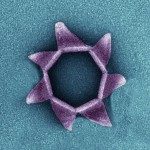Lien vers Pubmed [PMID] – 21278296
J. Bacteriol. 2011 Apr;193(7):1672-80
The genomes of two Sulfolobus islandicus strains obtained from Icelandic solfataras were sequenced and analyzed. Strain REY15A is a host for a versatile genetic toolbox. It exhibits a genome of minimal size, is stable genetically, and is easy to grow and manipulate. Strain HVE10/4 shows a broad host range for exceptional crenarchaeal viruses and conjugative plasmids and was selected for studying their life cycles and host interactions. The genomes of strains REY15A and HVE10/4 are 2.5 and 2.7 Mb, respectively, and each genome carries a variable region of 0.5 to 0.7 Mb where major differences in gene content and gene order occur. These include gene clusters involved in specific metabolic pathways, multiple copies of VapBC antitoxin-toxin gene pairs, and in strain HVE10/4, a 50-kb region rich in glycosyl transferase genes. The variable region also contains most of the insertion sequence (IS) elements and high proportions of the orphan orfB elements and SMN1 miniature inverted-repeat transposable elements (MITEs), as well as the clustered regular interspaced short palindromic repeat (CRISPR)-based immune systems, which are complex and diverse in both strains, consistent with them having been mobilized both intra- and intercellularly. In contrast, the remainder of the genomes are highly conserved in their protein and RNA gene syntenies, closely resembling those of other S. islandicus and Sulfolobus solfataricus strains, and they exhibit only minor remnants of a few genetic elements, mainly conjugative plasmids, which have integrated at a few tRNA genes lacking introns. This provides a possible rationale for the presence of the introns.
